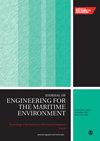A grouping module assessment method for ocean engineering systems: Subsea tree system as a case
IF 1.5
4区 工程技术
Q3 ENGINEERING, MARINE
Proceedings of the Institution of Mechanical Engineers, Part M: Journal of Engineering for the Maritime Environment
Pub Date : 2024-09-19
DOI:10.1177/14750902241272797
引用次数: 0
Abstract
In the ocean engineering environment, the quality failure data of complex systems are difficult to obtain due to the high experiment cost. In addition, using a single model to analyze risk, reliability, availability, and maintainability is a big challenge. Based on the fault tree, Dynamic Bayes and Markov models, a state assessment method for ocean engineering systems with multiple maintenance modes is proposed in this paper. This method gives full play to the advantages of the three methods, and comprehensively analyzes the risk, reliability, availability and maintainability. This method uses fault tree and Markov model to pre-process fault data, and then inputs the pre-processed fault data into the multi-state degradation model based on dynamic Bayesian theory. Considering the maintenance strategies of no repair, perfect repair, imperfect repair and preventive repair, the model is iterated and adjusted until the model has processed all the event data and the updated model can best reflect the state of the system. The method is verified by taking the subsea tree of the subsea production system as an example. The obtained tree reliability index (mean time without failure) is basically consistent with the failure statistics of offshore and onshore reliability databases, which verifies the accuracy of the proposed method.海洋工程系统的分组模块评估方法:以海底树系统为例
在海洋工程环境中,由于实验成本高昂,很难获得复杂系统的高质量故障数据。此外,使用单一模型分析风险、可靠性、可用性和可维护性也是一大挑战。本文基于故障树模型、动态贝叶斯模型和马尔可夫模型,提出了一种具有多种维护模式的海洋工程系统状态评估方法。该方法充分发挥了三种方法的优势,全面分析了风险、可靠性、可用性和可维护性。该方法利用故障树和马尔可夫模型对故障数据进行预处理,然后将预处理后的故障数据输入基于动态贝叶斯理论的多状态退化模型。考虑到无修复、完美修复、不完美修复和预防性修复等维护策略,对模型进行迭代和调整,直到模型处理完所有事件数据,且更新后的模型能最好地反映系统状态。以海底生产系统的海底树为例,对该方法进行了验证。得到的树可靠性指数(平均无故障时间)与海上和陆上可靠性数据库的故障统计基本一致,验证了所提方法的准确性。
本文章由计算机程序翻译,如有差异,请以英文原文为准。
求助全文
约1分钟内获得全文
求助全文
来源期刊

CiteScore
3.90
自引率
11.10%
发文量
77
审稿时长
>12 weeks
期刊介绍:
The Journal of Engineering for the Maritime Environment is concerned with the design, production and operation of engineering artefacts for the maritime environment. The journal straddles the traditional boundaries of naval architecture, marine engineering, offshore/ocean engineering, coastal engineering and port engineering.
 求助内容:
求助内容: 应助结果提醒方式:
应助结果提醒方式:


